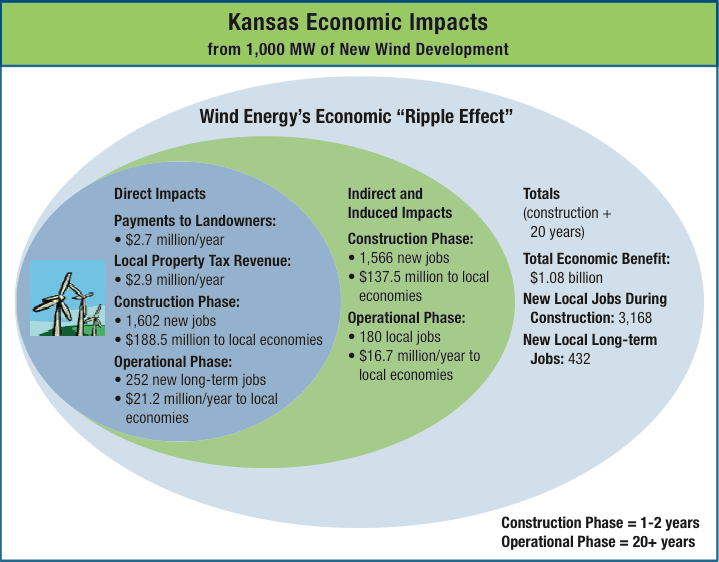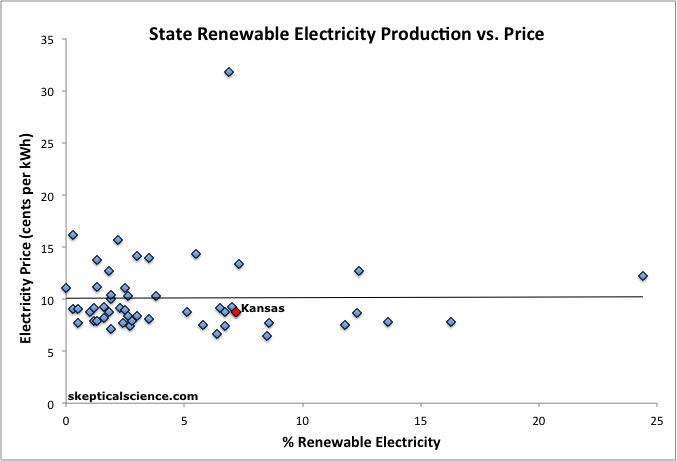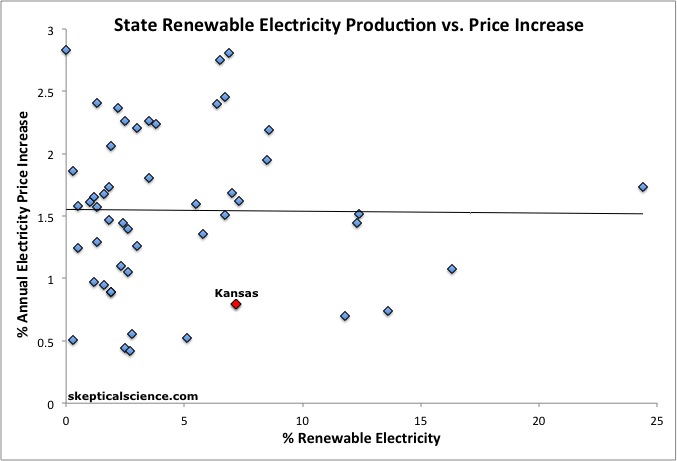Solving Global Warming Incrementally
Posted on 18 February 2013 by dana1981
Kansas is one of the 29 United States (plus the District of Columbia) which have implemented Renewable Energy Standards or goals (a further 7 states have non-mandatory renewable electricity goals; Figure 1).
Figure 1: States with Renewable Electricity Standards and Goals. Source: US Energy Information Administration (EIA).
Thse RESs require that a given state meet a certain percentage of its electricity demand with renewable sources by a certain date. For example, California has an RES to supply 33% of its electricity demand with renewables by 2020.
Recently, Kansas has been considering delaying or modifying the mandates in its RES, which currently requires that 10% of the state's average peak load come from renewable sources by 2010, 15% by 2016, and 20% by 2020. So far they have met their 2010 target (almost entirely from wind energy).
Climate Denial in the Kansas State Congress
In an effort to undermine the Kansas RES, Republican State Congressman Dennis Hedke, who is Chairman of the Kansas Congressional Joint Committee on Energy and Environmental Policy (and is a geophysicist with clients in the oil and energy industry) arranged for his committee to "hear arguments...that contradict some of these common beliefs about climate change." Among the invited contrarian scientists were Willie Soon (who has made a lucrative career of opposing any and all environmental legislation) and John Christy (who frequently testifies before US Congress on climate issues, and always misinforms our policymakers in the process).
In his testimony, in addition to showing many misleading and cherrypicked graphics, Christy made one of his and his fellow contrarians' favorite arguments against climate solutions – that reducing fossil fuel consumption will be too expensive and make too little difference.
"If you choose to make regulations about carbon dioxide, that’s OK. You as a state can do that; you have a right to do it. But it’s not going to do anything about the climate. And it’s going to cost, there’s no doubt about that."
Renewable Energy is Affordable
The first myth in Christy's quote, that renewable energy is too expensive, was also repeated by State Representative Charlotte O’Hara during these hearings.
"Our renewable standards are a failure. They resulted in higher energy costs..."
First of all, according to the US Energy Information Administration, wind (which as noted above, supplies almost all of Kansas' renewable energy production) is already cost-competitive with new coal plants, even when the external costs of coal combustion (for example, via climate change, air quality, and public health) are unaccounted for.
Second, as Dave Roberts noted at Grist, the Department of Energy has analyzed the effects of wind power on the Kansas economy, and they are considerable (Figure 2). A report by a Kansas City area law firm also found that wind farms in Kansas have created 13,500 jobs and produced an economic benefit of $13 million in lease payments to local landowners.
Figure 2: Economic benefits of wind energy implementation for Kansas, from the Department of Energy
Third, we have previously shown that there is no correlation whatsoever between renewable energy deployment and electricity costs in the USA. In fact, Kansas has both relatively cheap electricity rates (Figure 3), and has had among the lowest electricity price increases in the past two decades (Figure 4).
Figure 3: State renewable (excluding hydroelectricity) electricity percentage of total electricity generation vs. electricity price (blue diamonds; Kansas in red) with a linear trend (black line). Data from EIA (here and here).
Figure 4: State renewable (excluding hydroelectricity) electricity percentage of total electricity generation vs. the percent annual increase in electricity price 1990—2011 (blue diamonds; Kansas in red) with a linear trend (black line). Data from EIA (here and here).
Moreover, the two largest utilities in Kansas reported rate increases of just 1 to 1.7% to cover renewable energy investments in 2012 and 2013.
Thus Christy and O’Hara are simply factually wrong; there is no evidence that deploying renewable energy to meet 20–25% of a state's overall electricity demand will have any significant impacts on electricity prices. They will however help solve the global climate problem.
Christy's Tragedy of the Commons
The second claim in Christy's quote is known as the Tragedy of the Commons. This describes a situation in which all parties involved in a given system look out for their own best interests, over-exploiting a resource for their short-term interests at the expense of the long-term stability of the resource.
The concept of Nash equilibrium in game theory provides an analogous scenario. In our example we'll consider Kansas and California, each with $10. Reducing carbon emissions will cost either state $3. The consequences of global warming will cost each state $7 if no action is taken, and $4 if only one takes action. The potential resulting outcomes look like this (remaining funds for California in blue, and for Kansas in red):
|
|
Kansas |
||
|
|
Emissions Reduced? |
Yes |
No |
|
California |
Yes |
7, 7 |
3, 6 |
|
No |
6, 3 |
3, 3 |
|
Either side can only tie or win if they don't reduce emissions, and they can only tie or lose if they do reduce emissions. Thus it seems to be in each state's best interest not to reduce emissions. But the best overall outcome is if both sides reduce their emissions, in which case the net economic impact is smallest. If each party looks out only for its own best interest, the overall economic impact is largest.
A fishery provides another applicable analogy. It seems to be in each fisherman's best interest to catch as many fish as he can, but if all fishermen only look out for their best short-term interests, they can deplete the fish population and ultimately ruin the resource for everybody. If they all agree to limit their daily catches, then the resource can be maintained in a stable state, creating the best overall long-term result for all parties involved.
Solving Global Warming Incrementally
The point is that any state or even country can argue that their emissions are too small to matter on a global scale, and that reducing them will put the state or country at an economic disadvantage in the process. And by looking out for their own best interests in this manner, as Christy advocates, they would be ensuring that the best overall outcome does not happen, making themselves poorer in the long run.
Christy's argument has already failed in court as well. In Massachusetts v. Environmental Protection Agency (EPA), the EPA tried to argue in 2007 that vehicular greenhouse gas emissions in the USA are too small on a global scale to require regulation. The US Supreme Court rejected that argument, noting that that incremental steps are still important; even if a single action can't reverse global warming, it can still slow or reduce it.
Indeed with a problem of the immense global scope of climate change, which everybody is contributing to, the only way to solve it is via many small, incremental steps. There is no climate silver bullet solution – everybody needs to chip in, including Kansas and the USA. By going around the country and the world telling everyone that they are too insignificant to make a dent in global warming, climate contrarians are trying to ensure that we fail to solve the problem.
We need everyone to ignore the claims made by Christy and his contrarian cohorts, and do their incremental part to help solve the problem. The good news is that because wind and solar energy are becoming increasingly cost-effective, there are many climate solutions that will be relativley painless to implement, as long as we don't allow the contrarians to dissuade us from deploying them.































 Arguments
Arguments

































Comments